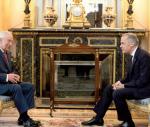You are here
American and Arab uprisings converge
Feb 02,2017 - Last updated at Feb 02,2017
Never in my life, which has spanned the United States and the Arab world, have I experienced a moment such as the past week when ordinary Americans and ordinary Arabs shared exactly the same sentiments of personal vulnerability, indignity and political anger.
In the US in the past week, I saw a precise mirror image of the Arab world I have experienced my whole life — with one important difference. This should be a really valuable learning moment when Arabs and Americans, who value freedom and the dignity that comes with it, can overwhelm the ugly hatred, ideological venom and lies that assorted special interest groups in both societies impose on the majority of people.
Millions of Americans have been reacting spontaneously to the Trump administration’s executive orders temporarily halting the admission of refugees and specifically refusing entry to individuals from seven Muslim-majority countries.
Individual Americans have taken to the streets, the media, the political system and the courts of law for many different reasons — they found the Trump measures unconstitutional, un-American, unethical, unfair or un-anything else, including being harmful to economic growth and innovation — instinctively felt in their hearts and minds the need to challenge their government through all available legitimate means.
They were outraged that their presidential system could wield power so whimsically and unilaterally, implementing measures that were deeply offensive to many citizens’ sense of decency in America.
They also felt fearful for their and their children’s future.
They saw the danger of how a small group of people, including members of a single family, could destroy social and economic policies that have been painstakingly built up for decades to assist middle class and low-income families, protect the environment, promote justice for all and maintain an open, inclusive and participatory political system, all the while enriching the wealthy and enhancing the power of a small minority at the peak of the political pyramid.
American citizens experienced in one week what several hundred million Arab men and women have been experiencing for the past half a century or so: power structures that are controlled by a small number of men, revolving around a single family, closely tied to corporate business interests, and taking decisions unilaterally with little interaction with or respect for the elected legislative branch of government, expertise in the scholarly and civil society worlds or the domestic and international rule of law.
It has been fascinating to watch many sectors of American society spontaneously and vigorously stand up and challenge the Trump decisions.
These included ordinary citizens in the streets, university professors and administrators, corporate presidents, human rights and lawyers’ organisations, journalists from all corners of the media world, government officials at the federal and local levels, and many others.
Ordinary Americans now should be able to appreciate what it felt like in January 2011, when hundreds of thousands of ordinary Arab men and women similarly took to the streets to challenge the unjust, heavy-handed ways of their long-serving, family-based, security-anchored leaderships.
Several hundred million ordinary Americans — about the same number as their Arab counterparts in 2011 — have been glued to their television and computer screens, following every new development in this historic moment when millions of people spontaneously stand up and hold their moral ground as citizens who insist on protecting their rights as citizens.
We, in the Arab world, should be generous and merciful to our American brothers and sisters, and not say that this is a Facebook or Twitter movement in the US — as many in the US said about the Arab uprisings.
Because Facebook, Twitter and the social media world have been mere instruments for sending messages, not major elements of substance or drivers of conscience.
The real (and universal) story here is the courage and determination of individual men and women who stand up, openly confront their home-grown bigots and autocrats, and protect that beautiful and precious terrain where liberty, dignity and equal opportunity converge in the everyday lives of individual people, and in their constitutions if they are lucky.
Arabs have not been so lucky.
The single big difference between this American uprising and the Arab one, six years ago to the week almost, is that Americans can use available means of political dissent and legal challenge and restraint that live in their political governance system.
Arabs had and have no such avenues open to them, other than peaceful demonstrations in the street.
Even there, tens of thousands of Arabs sit in jail today because they dared to take to the street and speak out against their governments’ harsh policies.
In the final analysis, though, these are not tales of acts in the street, but rather of impulses in the heart.
The blood and the values that flow through Arab and American veins can now be seen to emanate from a single source of human dignity, vitality, decency, respect for the law that protects everyone equally and the indomitable will to be free in one’s own home.
I stand in awe at Americans who work in so many ways to affirm their values when those values are threatened or curtailed.
I stand in equal awe at Arabs who have tried without success for half a century to achieve the same goal, with no real political and legal tools at their disposal.
Those tools will come to our lands one day soon, however, and not because they travel the digitised routes of social media, but because the blood in our veins that seeks the fresh air of full citizen rights and the rule of law for all will burst out to overwhelm the autocrats and flood the streets with goodness and decency.
I suspect Americans appreciate this a little more clearly this week.













